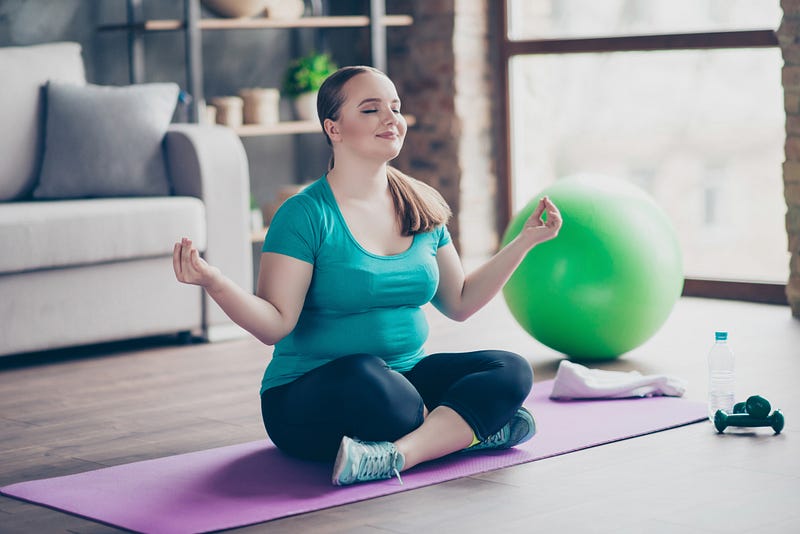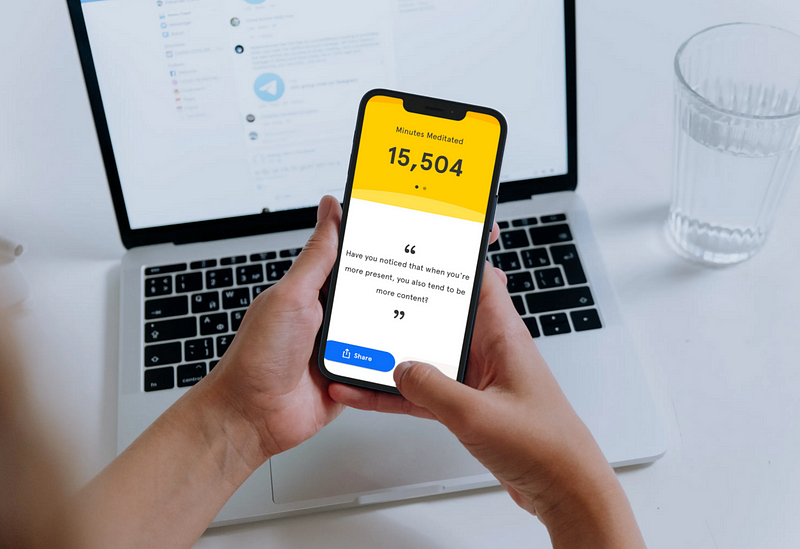Training your mind can transform your life.

It’s winter 2013, and I’m twenty years old. I’m walking through a corridor at university, heading towards my very first psychologist appointment. I’m hopeful because I don’t know yet that the doctor will diagnose severe depression and ask me to quit my studies.
It’s in this moment over my hopefulness that I wonder how I lost control over my life. I hate my job. My roommate just kicked me out, and my boyfriend left me. I feel unworthy, lonely, and lost.
“Time doesn’t heal. It’s what you do with time,” Edith Eger wrote. Weeks went by, but I still wished to get sick, so I had a reason to stay in bed. I had no courage for any kind of introspection.
Today, like most mornings this year, I woke up smiling. I love my life.
Meditation is a powerful way to heal. Here’s what I learned from meditating every day for six years.
Expect unexpected benefits
Athletes meditate to improve their focus, stock traders to circumvent cognitive biases, and CEOs to quieten their minds. I meditated to feel better.
People try meditation for various reasons. Most benefit from it beyond their expectations:
- A meta-analysis with more than 1,200 adults found meditation can decrease anxiety.
- In a randomized controlled trial, researchers found that mindfulness meditation reduces loneliness and enhances social interactions.
- A study from the University of North Carolina showed individuals who completed a meditation exercise had fewer negative thoughts when seeing negative images.
- This 8-week study showed workers who did daily 13-minute meditations reported better well-being and less distress.
The most unexpected benefits for me were better sleep, a constant feeling of inner calm, and being able to let go of the things I can’t control. I’m less stressed because I understand stress is the difference between reality and how I want reality to be.
Your experience will vary. But no matter your reasons, meditation will help you advance in life and improve your well-being on surprising levels.
“It’s not an escape from reality. It’s getting in touch with reality at least for two hours a day. I actually observed reality as it is, while for the other 22 hours I get overwhelmed by emails and tweets and funny cat videos. Without the focus and clarity provided by this practice, I could not have written Sapiens and Homo Deus.”
— Yuval Noah Harari in an interview with Tim Ferriss
Training your mind equals mind transformation
Long before learning from Eckhart Tolle, Tara Brach, Thích Nhất Hạnh, Sadhguru, Deepak Chopra, and Jon Kabat-Zinn, I watched a TED talk by Buddhist monk and Dalai Lam interpreter Matthieu Ricard. He said:
“It’s more to say that mind training matters. That this is not just a luxury. This is not a supplementary vitamin for the soul. This is something that’s going to determine the quality of every instant of our lives.
We are ready to spend 15 years achieving an education. We love to do jogging, fitness. We do all kinds of things to remain beautiful.
Yet, we spend surprisingly little time taking care of what matters most — the way our mind functions — which, again, is the ultimate thing that determines the quality of our experience.”
One year from my psychologist’s diagnosis, my circumstances had changed. I had an exciting job in New Delhi and fell in love with a boy who will become my husband.
Yet, my inner state of mind hadn’t changed as much as I thought it would.
You can land a prestigious job, earn tons of money, and find a wonderful partner — if you don’t change your mind and the lens through which you look at life, none of it improves your well-being.
Once you’ve meditated for a few months, you can see and interrupt thought patterns before you chase them down the abyss. You can see worry and let it go without sticking to it all day.
Research shows your brain physically grows when you meditate. Gray matter concentration changes in brain regions involved in learning and memory processes, emotion regulation, self-referential processing, and perspective-taking.
When you train your mind with meditation, you rewire your brain for well-being. Again Matthieu Ricard:
“Well-being is not just a mere pleasurable sensation. It is a deep sense of serenity and fulfillment. […] Now, it takes time because it took time for all those faults in our mind, the tendencies, to build up, so it will take time to unfold them as well.
But that’s the only way to go. Mind transformation — that is the very meaning of meditation.”
Meditate first thing in the morning
Even with the clear intention to meditate during the day, skipping the practice is easy. Meditating never feels urgent, and timebound to-do’s get in the way.
When your mind is in full-speed working mode, pausing becomes harder and harder. Once you’re in the monkey mind zone, it’s tough to zone out into the zen mode.
I agree with Naval Ravikant, who said: “Everyone says they do it, but nobody actually does. The real set of people who meditate on a regular basis, I’ve found, are pretty rare.”
My six-year experience taught me: If you don’t sit down first thing in the morning, you likely won’t meditate all day.
Here’s how you can trick yourself into sitting down every morning: Put your phone on flight mode before you go to sleep. Turn it on only after you meditated.
Dr. Nikole Benders-Hadi, a psychiatrist, says: “Immediately turning to your phone when you wake up can start your day off in a way that is more likely to increase stress and leave you feeling overwhelmed.”
If you have an old device (I use my old phone), install nothing but your meditation facilitator (YouTube, a timer, or a meditation app). Alternatively, you can download whatever you need to meditate on your current device to have it available offline.
Get out of bed, brush your teeth, drink a cup of water, and sit down on a pillow (not in your bed; you likely fall back to sleep).
“All of humanity’s problems stem from people’s inability to sit quietly in a room alone.” — Blaise Pascal
Happiness is the absence of desire
Before I meditated, I thought happiness is something you attain. I thought I’d be happy once I had a specific income or spend a vacation in Bali.
But the opposite is true. You’re truly content and happy when you’re mind is free from desire. You’re full of bliss when you stop wishing you’d rather be somewhere else, doing or having something different.
Happiness is a by-product of complete presence.
You’re truly happy when you silence your inner chatter. You feel content when you stop judging what you’re experiencing and just experience.
“When we do not expect anything, we can be ourselves.”
— Shunryu Suzuki
Never skip two days in a row
As with all new habits, building a meditation habit is hard first. It requires the willpower to sit down every day instead of keeping yourself busy.
Meditating is like running or weight lifting. The more days you skip, the harder it is to get back into the rhythm.
What helped me to build a habit was a 30-day challenge. I set the intention to meditate every day for 30 days using Headspace. The duration didn’t matter. I started with 3-minutes and ended with 10-minutes.
I didn’t like it at first.
But I loved the effects the training had on my everyday life.
Life’s Only Constant is Change
When you sit still and scan through your body, you notice all kinds of sensations. Itchy toes, lungs expanding with air, the cold air flowing in through your nostrils. With every moment, your sensations change.
While meditating, you feel life is a constant state of change and that this change is okay.
In 2019, I went to a 10-day silent meditation course. During a Vipassana training, a Buddhist term that often translates to “insight,” you wake up at 4 AM and meditate for 10 hours every day. You don’t talk, write or speak.
The days were tough. I went to the course expecting relaxation and flow states. Instead, it felt as if I was nonstop working and doing tough inner work. But this practice helped me develop equanimity.
Instead of instant reactions, meditation helps you notice whatever is going on, become aware of it, label it, and then act.
Don Johnson, a meditator for 49 years, writes: “The purpose of meditation is not to control the mind. A quiet mind happens as a result of a connection to an inner experience of peace.”
Regular meditation is a mental tool that will allow you to deal with any hardships of life. By applying this technique, you’ll achieve and share true happiness with others.
You Need Thoughts to Do Your Mental Pushups
For a long time, I believed freedom of thought was the ultimate goal of meditation. So I talked myself down every time thoughts crossed my mind and thought my mind wasn’t made for meditation.
I was wrong.
The goal of meditation isn’t to get rid of thoughts. In fact, you need your thoughts to meditate. Without thoughts, you wouldn’t have any object of practice.
Thoughts are the weights in your mental gym. Your job is to return your attention away from them and back to your breath (or any other point of focus like a candle, a mantra, or a body part).
When I meditate, I follow my breath — inhales and exhales. Sometimes my mind will wander to thoughts or feelings. And when it does, I acknowledge them and come back to my breath.
This is the core of meditation. Catching yourself while being distracted. The more you practice, the better you’ll get at noticing when you’re unfocused.
Now I think of thoughts as mental push-ups. The more thoughts I have, the more opportunities for exercise.
Thoughts can be contradicting, harmful, wonderful, or crazy. But you are not your thoughts. They are the vehicle that carries you through life. When you meditate, you become the driver.
“I’ve had a lot of worries in my life, most of which never happened.”
— Mark Twain
In Conclusion
Meditation is a highly effective tool to train your mind. A regular practice can help you let go of fear and anxiety, focus on the present moment, and find inner calm. Meditation is the entryway to a more fulfilled and joyful life.
When building a practice, it’s important not to be too hard on ourselves. Skipping meditation once in a while doesn’t matter. What matters is consistency. You’ll only return to your practice if you don’t judge or push yourself too hard.
Most importantly, it’s your practice. Your habit can look different from mine or the guru’s recommendations. But once you find a ritual that works for you, stick to it.
Use a facilitator to get started. Meditation apps like Calm, Headspace, Waking Up, or Insight Timer can support you in building a robust habit. You can also start with guided meditations on YouTube, such as this one or this one.
Want to feel inspired and improve your learning?
Subscribe free to The Learn Letter. I read a book and 50 articles a week, and each Wednesday, you’ll receive the best in your inbox. This newsletter will make you find tools and resources that help you on your path to health, wealth, and wisdom.

